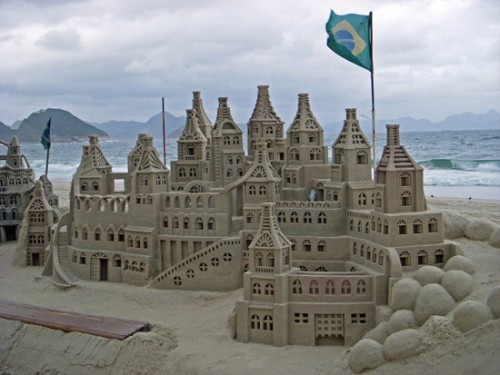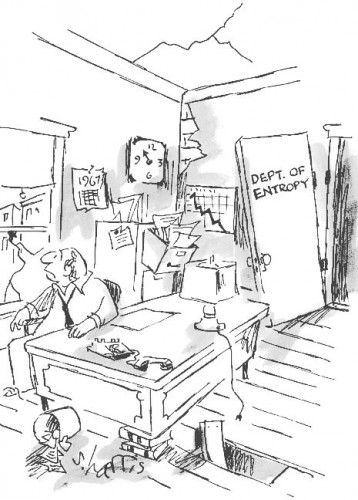
We couldn’t be more excited to have another guest post from Michael Belote of Reboot Christianity. This time, he talks about “spiritual entropy” – the idea that our lives tend to become less organized or “together” as time goes on:
Scientists have a crucial insight about the world when they talk about entropy, that is, a system’s tendency to become more disorganized over time. It certainly applies to our inner lives. To explain what I mean, I have to start with a little science lesson.
One of the most important subjects to an engineer is that of thermodynamics – the study of energy conversion from one form to another. The Second Law of Thermodynamics (SLOT) is among the most thoroughly-proved laws in physics. Put in layman’s terms, SLOT says three basic things (I paraphrase in parentheses):
 1. Heat will never naturally flow from a cold object to a hot object (or: You’ll Never Buy A Perfect Refrigerator).
1. Heat will never naturally flow from a cold object to a hot object (or: You’ll Never Buy A Perfect Refrigerator).
2. It is impossible to create an engine that perfectly converts all heat to useful work (or: You’ll Never Buy A Perfect Engine).
3. Unless acted upon by outside energy, a system will either have the same or more disorder as time passes (or: Today Is Always Worse Than Yesterday – but that’s jumping the gun).
The third point there is the one I wish to discuss.
Entropy is the measure of how disorganized and random a system is. The Second Law of Thermodynamics says that unless outside energy is provided, a system will find its entropy (disorder) staying the same or increasing as time goes on. A system will never get more ordered without outside intervention.
An example might be helpful–say that I give you two photographs of the beach. Photograph A is of sand lying about randomly. Photograph B is of the sand stacked up and arranged to make a sand castle. If I ask you to put them in chronological order, then you can do so easily. Obviously the sand castle did not build itself, so Photograph B must be the “start”, and photograph A is the “end.”
People intuitively know this to be true: a system is not going to gain more organization unless energy is put into it. My son’s Lego blocks won’t build themselves into a spaceship—he must put the energy of his play into them. Similarly, his room won’t naturally become cleaner and more organized as time goes on. Sand castles do not spontaneously form—a little girl must put her energy into building it. If I shake a puzzle box, it will not naturally fall together to make a puzzle; if I shake a puzzle, it will disintegrate.
The Second Law of Thermodynamics, however, has wider applications even in science than just beaches or chemical reactions. Consider learning, for example. Stephen Hawking, in his book A Brief History of Time, estimated that if you read his book you would have read about two million bits of information; in the process, however, you will have generated a disorder increase of the universe of over twenty trillion trillion bits. There is no free lunch – everything we do increases disorder in the universe. This world is inevitably running down.
 This is a law which is fairly self-evident. It’s natural for us to realize that things will decay over time unless we actively maintain them. I believe there’s a similar law in our spiritual life—that the law of entropy applies also to our souls. We Americans are a society with an extreme addiction to ‘self-help’. We believe that by exercising and dieting and working hard and pulling ourselves up by our bootstraps, things will get better in life—although this often proves to be untrue. Applying this same logic to religious impulses, we think that through Oprah and Dr Phil and yoga and Zen reflection and other new age-isms, we can somehow make ourselves more spiritual people.
This is a law which is fairly self-evident. It’s natural for us to realize that things will decay over time unless we actively maintain them. I believe there’s a similar law in our spiritual life—that the law of entropy applies also to our souls. We Americans are a society with an extreme addiction to ‘self-help’. We believe that by exercising and dieting and working hard and pulling ourselves up by our bootstraps, things will get better in life—although this often proves to be untrue. Applying this same logic to religious impulses, we think that through Oprah and Dr Phil and yoga and Zen reflection and other new age-isms, we can somehow make ourselves more spiritual people.
We Christians do the same thing of course—let’s face it, a lot of churches make such “practical” messages their focus. If you just give till it hurts, if you just serve in enough ministries, if you just show up at church every time the doors are open, then you will become spiritual. But what if the laws of entropy are at work on our spirits every bit as much as they are at work on our bodies and at the beach? You cannot simply will yourself to be more spiritual, more orderly. Left to your own devices, you will decay into sin – incurvatus in se, as Luther called it. “Curved in on ourselves.”
But spiritual entropy says that no matter how hard we try, no matter how tightly we cling to the standards we follow (be it Mosaic Law or modern church expectations or Zen Buddhism or American societal norms or organic environmentalism or political philosophy or new-age scientism), we cannot grow spiritually as closed systems. Trying to ‘will’ oursevles to spirituality by adhering to some form of law will always fail–we will tend to either stay the same or get worse, but certainly no better. Willpower is insufficient to overcome the natural decay of life. If we are left to our own devices, we tend to degenerate.
I believe that “progress” in one area must always come at an overall cost to the system – as long as it comes from within, that is. If I get better in one area, other areas will get worse. I may develop a great new hobby I share in with my kid, but it distracts me at work. Spiritually, maybe I’m donating time to ministry but have become short-fused with your family. I may become more pious and avoid certain behavioral sins altogether, but I become judgmental and cruel to others in the process. Remember, the total amount of entropy (disorder) in your soul will always stay the same or get worse. If you make a gain through sheer willpower, something else will get worse and offset it.
If we wish to grow as people, it is mandatory that we admit our own inabilities to “make it happen.” We’re like the sand on the seashore, and no amount of “wanting” is going to make us change into a sand castle. You simply do not have the ability to build yourself up that way: the law of entropy forbids it. If we wish to be built up, it can only occur from without. We must have an influx of outside energy to grow spiritually–always. In a closed system, based only on human effort and striving, entropy must prevail.
If the work comes from energy outside of us (i.e., God), then we may dispense with the delusion of believing that we’re “partnering” with Him to make it happen. When my wife builds a sand castle, the sand is not “partnering” with her: it simply lies dormant and allows her to work it into the proper form—adding water if it is too dry, fitting it into the shape of a tower here or a drawbridge there.
By the same token, God does not need a partner. He needs simply a willing spirit that says, “God, I wish you to make me as you see fit. I yield to your plans.”
“But if it is by grace, it is no longer on the basis of works: otherwise grace would no longer be grace.” – Rom 11:6

COMMENTS
7 responses to “Spiritual Entropy, or: The Second Law of Thermodynamics and the Fallacy of Self-Help Christianity”
Leave a Reply













I love the main point here and a lot about how it’s communicated. I’d love to see a follow up that further breaks down how the changes that happen “without” play themselves out practically. For example, for understanding the way God works, it might be helpful for someone to write things down. The Lord calls us to be disciplined and He is the reason we can be disciplined and have the result be a net positive. But the human must be the one to put the pen to the paper. How can one differentiate between effort within and working “without”?
One’s mind is renewed by reading Scripture and praying.
AWESOME ARTICLE !
Especially after reading some dark information about the same subject from a thiestic evolutionist with a PhD – (Piled Higher & Deeper)
Thanks be to God for your spiritual insights.
Wonderful. Can i get a coppy
Hallelujah!
I am so blessed with this spiritual entropy #thirdpoint!
“By the same token, God does not need a partner. He needs simply a willing spirit that says, “God, I wish you to make me as you see fit. I yield to your plans.”
I understand what the article is communicating, but then my question is: So, what then is our role? In practical terms, what does this mean? As someone else commented, “But the human must be the one to put the pen to the paper. How can one differentiate between effort within and working “without”?
It would be great if the author would address this point in another article. 🙂
[…] entropy provide insights, by analogy, to our spiritual lives? This author thinks that “spiritual entropy says that no matter how hard we try… we cannot grow spiritually […]
Amen. An article I will share with my three teenagers. Thank you.
Peace.